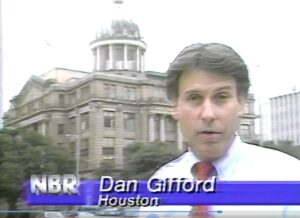Dan Gifford takes hard look at Houston ‘Financial Fraud’ on KUHT, Channel 8
Organized crime and murder for hire outted

Dan Gifford takes hard look at `Financial Fraud'
By ANN HODGES, Houston Chronicle TV Editor
FEBRUARY 2, 1989
Publication: Houston Chronicle
Page: 8
WELL, well, well...what's happening here? There's a hard-hitting local documentary on tonight's lineup, and it's on PBS Channel 8, of all places.``Financial Fraud'' is the name, and what's behind some of those failures of local banks and savings and loans is the game. The producer/reporter/writer is Dan Gifford, who's been following that long-running sad story for ``MacNeil/Lehrer NewsHour'' and the `` Nightly Business Report,'' among others.
The launch pad for this valuable primer on financial scams is a new congressional subcommittee report claiming that 30 percent of bank failures and 80 percent of the failures of savings and loans have been caused not by our sagging economy or the oil crunch, but by fraud.
Those figures are, of course, a subject of hot debate, and both sides of that ongoing argument are well-represented here.
Gifford's ``60 Minutes'' style is to put the talking heads on camera, then put the hard questions to them. And he does that here, with many local names and faces.
He addresses allegations of organized crime connections and murder-for-hire plots; he questions some S&L officers about alleged fraudulent loans; he gets one government expert to admit that ``in many cases'' the fact that the federal regulators are not bankers has been unduly harmful to the S&Ls; he gets some of the news media to admit that they've given the story short shrift (``White-collar crime is not good TV pictures,'' says news veteran Garvin Berry), and he explains why all of us out her e need to keep up with what's happening, because in the end, it's going to cost us. When lending institutions fail, someone has to pay - and, as usual, that someone is us.
``It is a `victimless crime,''' says one of Gifford's guests, ``until the taxpayers start paying, and they become the victims.'' In this case, that bill for bailing out the failures could run as high as $1,300 per U.S. household, Gifford says.
He presents a handbook of the most popular scams, and with the help of his guests, a profile typical of today's educated con man. He is the product of ``a generation of greed,'' some say, and they're being turned out wholesale from college business schools, with holes in their heads where ethics used to be. Today's con man is ``the fast-buck barbarian, in a Brooks Bros. suit, with a $300 pen,'' suggests Pete Riga, writer on ethics.
If you're a financial whiz or even a regular reader of the business news, this TV report may seem elementary rehash, my dear Watsons. But if you're one of those economic illiterates whom our colleges and universities have been turning out for years (there are a lot more of us, I suspect, than there are of the whizzes) then you'll certainly learn something. At least enough to think the time's long past for a long, hard look at the FSLIC and its regulations and operations.
The hour on ``Financial Fraud'' starts at 8 on Channel 8.
###